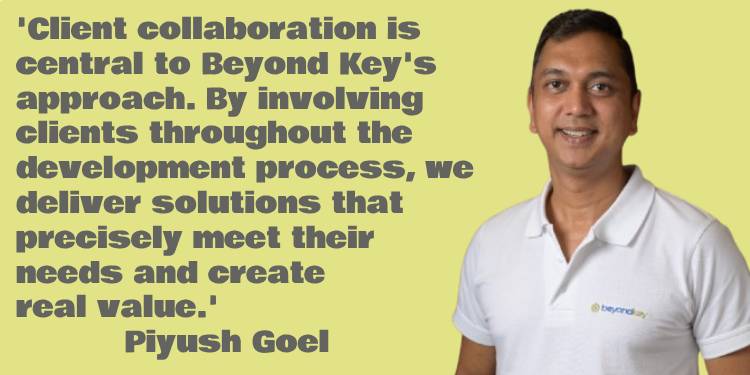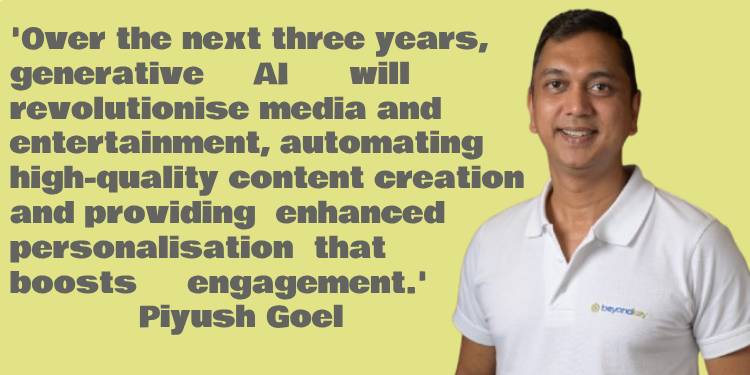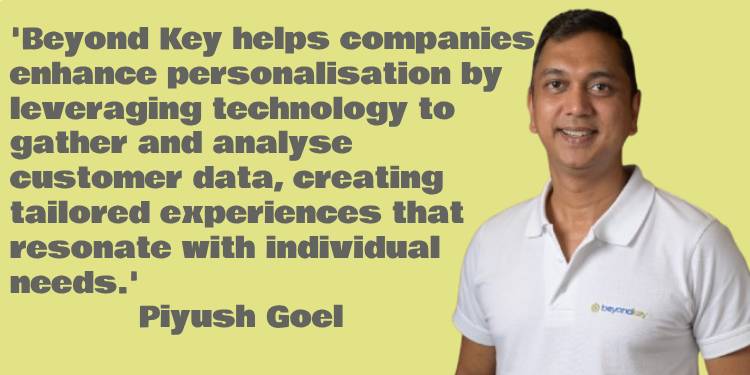Founded in 2005, Beyond Key is a global provider of technology solutions, specialising in end-to-end software development and consulting services. The company focuses on delivering scalable, user-friendly solutions across various industries, including expertise in Microsoft 365, business intelligence, data analytics, cloud computing, and artificial intelligence.
With a team of over 325 experts, Beyond Key offers core services in cloud computing, data management, omni-channel engagement, and client engagement strategies. The firm serves clients across the US, Canada, the UK, the Middle East, and Australia, focusing on digital transformation and product engineering.
Medianews4u.com caught up with Piyush Goel, CEO, founder Beyond Key
1. How has Beyond Key evolved as a company in terms of its offerings since setting up operations in 2005?
Since 2005, Beyond Key has evolved from a focused technology solutions provider to a comprehensive partner in digital transformation. Initially centred on scalable software solutions, the company expanded its expertise to include cloud computing, business intelligence, data analytics, and artificial intelligence, adapting to the advancing digital landscape.
This growth reflects a commitment to simplicity, innovation, and collaboration. By involving clients in the development process and valuing their feedback, Beyond Key has consistently refined its offerings. With a team of over 325 domain experts, Beyond Key empowers clients globally, driving business success in a rapidly changing world.
2. How does the company’s focus on simplicity, client collaboration, and continuous improvement give it and its clients an edge?
Beyond Key’s commitment to simplicity, client collaboration, and continuous improvement sets it apart globally. By focussing on simplicity, Beyond Key ensures that its solutions are intuitive and tailored, minimising the complexity often linked with advanced technologies. This makes it easier for clients to implement and integrate these solutions smoothly into their operations.
Client collaboration is central to Beyond Key’s approach. By involving clients throughout the development process, the company delivers solutions that precisely meet their needs and goals. This partnership allows Beyond Key to create customised solutions that provide real value.
Continuous improvement is also key to Beyond Key’s success. By consistently seeking client feedback and staying ahead of technological trends, the company refines its offerings, delivering cutting-edge solutions that keep clients competitive and well-prepared for future challenges in a rapidly evolving market.

3. The aim is to have high double digit growth year over year. What is the game plan to achieve this?
To achieve high double-digit annual growth, Beyond Key has crafted a strategic plan based on three pillars: expanding service offerings, deepening client relationships, and investing in innovation and talent. By broadening its portfolio to include emerging services like AI, cloud computing, and data analytics, Beyond Key stays ahead of industry trends and attracts new clients.
Strengthening client relationships through enhanced collaboration and tailored solutions generates loyalty and generates repeat business. Investing in innovation and top talent ensures the delivery of cutting-edge solutions. This strategy positions Beyond Key as a leader in digital transformation, driving significant growth.
4. How is AI boosting operational efficiency for clients in sectors like media, entertainment, and e-commerce?
AI is revolutionising operational efficiency in media, entertainment, and e-commerce by automating tasks, enhancing decision-making, and optimising resource allocation. In media and entertainment, AI automates content tagging, metadata generation, and video editing, freeing creative teams to focus on innovation. E-commerce benefits from AI-driven automation in inventory management, order processing, and customer service, minimising errors and reducing human intervention.
AI also enhances decision-making by providing advanced analytics that predicts content trends and understands audience preferences in media, while in e-commerce, AI insights guide decisions on product offerings, pricing, and marketing. Additionally, AI optimises resources by accurately forecasting demand and managing supply chains, helping e-commerce retailers prevent overstock or stockouts and enabling media companies to schedule content based on predicted peak consumption times. The integration of AI thus enables clients to achieve higher efficiency, lower costs, and gain a competitive edge in the market.
5. How does the company see gen AI evolving in the coming three years and reshaping industries like media and entertainment?
Over the next three years, generative AI is set to revolutionise media and entertainment through a series of transformative advancements. In content creation, AI will automate the generation of high-quality text, video, and audio, allowing for the production of personalised content with minimal human input. Enhanced personalisation will see AI analysing user data to deliver tailored experiences, from movie recommendations to targeted advertising, significantly boosting engagement.
In production, AI will streamline processes like scriptwriting, video editing, and special effects, reducing costs and allowing creators to focus on innovation. Additionally, AI-driven interactive experiences, such as immersive VR and AR environments, will create more dynamic and engaging content. Dynamic storytelling will allow for real-time adaptive narratives based on user interactions. Lastly, AI will provide data-driven insights into audience behaviour, enabling more effective content strategies and marketing efforts. Generative AI will drive innovation, efficiency, and personalisation, reshaping the media landscape.

6. How can organisations benefit from the interplay between AI, big data, IOT, Robotics and cloud computing?
Organisations can achieve significant benefits by integrating AI, big data, IoT, robotics, and cloud computing. AI acts as the brain, interpreting vast data from IoT devices, which monitor everything from production lines to customer behaviour. Big data analytics processes this information to uncover valuable insights, while robotics uses these insights to automate tasks, boosting productivity and accuracy. Cloud computing provides a scalable infrastructure to support these technologies, enabling businesses to access powerful tools without heavy hardware investments. This synergy allows organisations to innovate rapidly, respond to market shifts, and enhance operations, leading to growth and a competitive edge.
7. How does Beyond Key help companies improve the personalisation of experience which is important in any consumer facing industry?
Beyond Key is helping companies enhance personalisation in consumer-facing industries by leveraging advanced technology to understand and cater to individual customer needs. Their solutions focus on gathering and analysing vast amounts of customer data to uncover meaningful insights. This data-driven approach allows companies to create tailored experiences that resonate with each customer.
Moreover, Beyond Key helps companies track and manage clients’s customer interactions seamlessly, ensuring that every touchpoint is personalised and relevant. This personalised approach not only boosts customer satisfaction but also encourages stronger relationships and loyalty. In essence, Beyond Key helps businesses turn data into meaningful experiences, making every interaction with their clients more engaging and impactful.

8. Along with AI digital transformation is another buzzword. What factors need to be kept in mind for it to work?
For AI to effectively drive digital transformation, prioritising human-centric factors is essential. AI integration must align with business goals, ensuring that it directly supports objectives like enhancing customer experience, boosting efficiency, and driving innovation. User adoption is equally crucial, as successful AI implementation depends on employee engagement, comprehensive training, and ensuring that the technology is user-friendly. The effectiveness of AI hinges on data quality, making accurate, relevant, and up-to-date data vital for deriving meaningful insights. Ethical considerations, such as data privacy, bias, and transparency, must be addressed to ensure responsible AI use.
Clear policies should guide AI implementation to maintain fairness and prevent misuse. Finally, continuous improvement is key; AI systems should be regularly reviewed and refined to stay aligned with feedback and evolving business needs. By focussing on these factors, businesses can fully channel AI’s potential for a more impactful and successful digital transformation.

















